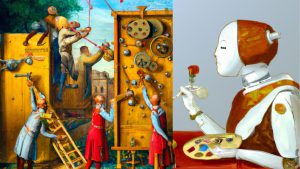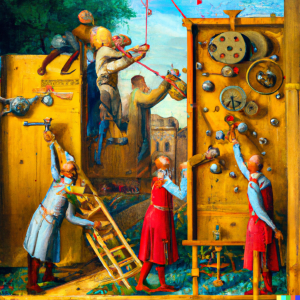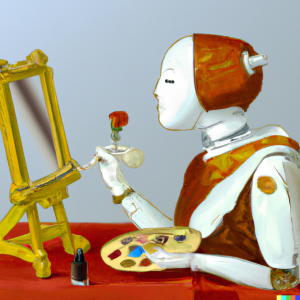Webinars: AI Inputs, Outputs and the Public Commons
Better Internet
“AI Inputs and Outputs” by Creative Commons was made from details from two images generated by the DALL-E 2 AI platform with the text prompts “A Hieronymus Bosch triptych showing inputs to artificial intelligence as a Rube Goldberg machine; oil painting” and “a robot painting its own self portrait in the style of Artemisia Gentileschi.” OpenAI asserts ownership of DALL-E generated images; CC dedicates any rights it holds to the image to the public domain via CC0.
Artificial intelligence (AI) has been exploding across the digital landscape — from people sharing text and images generated by AI platforms, to new policy that tries to shape a future where AI is expected to play an even bigger role — all while we aren’t really sure yet even how to define AI, much less understand all the impact it will have.
Here at CC, we’ve been thinking about what AI means for the commons we support, both in our strategy for better sharing and for our collaboration for a better internet. Are all these new works generated by AI part of the open, public commons? Should they be? If someone does hold copyright for an AI work, who is it? The technologists who created the AI tool? The person who uses AI to generate a work? The countless creators whose works trained the AI? The machine itself? Or should works generated by AI live in the public domain, as they do in many interpretations of established law?
Going beyond AI’s outputs: How do and should human works participate in training AI? Currently, AI platforms are using untold amounts of existing content to train their systems. Not every creator welcomes their work being used in AI, especially when AI is put to life-changing uses that could amplify biases, like predictive policing, facial recognition, job recruiting, insurance claims, or loan approvals. At the same time, if AI inputs are limited, AI could be based on a more narrow view of the world that could also perpetuate biases and block insights. How can we best ensure AI is trained to support creators and good outcomes?
As we form our positions at CC, we are bringing together people with diverse perspectives to participate in broad discussions about how AI intersects with open sharing in a commons that serves the public interest.
How does the proliferation of AI connect to better sharing: sharing that is inclusive, just and equitable — where everyone has wide opportunity to access content, to contribute their own creativity, and to receive recognition and rewards for their contributions? How does the proliferation of AI connect to a better internet: a public interest vision for an internet that benefits us all?
Read our thoughts about the discussion at these two free, public webinars: one focused on how open works and better sharing intersect with AI inputs — works used in training and supplying AI — and another focused on how open works and better sharing intersect with AI outputs — works generated by AI that are, could be, or should be participating in the open commons.
Webinars
AI Inputs and the Public Commons: Wednesday 9 November 2022

“AI Inputs” by Creative Commons was generated by the DALL-E 2 AI platform with the text prompt “A Hieronymus Bosch triptych showing inputs to artificial intelligence as a Rube Goldberg machine; oil painting.” OpenAI asserts ownership of DALL-E generated images; CC dedicates any rights it holds to the image to the public domain via CC0.
A free, public webinar on how open works and better sharing intersect with AI inputs — works used in training and supplying AI — with panelists:
- Abeba Birhane, Senior Fellow in Trustworthy AI, Mozilla Foundation
- Alek Tarkowski, Co-Founder and Director of Strategy, Open Future Foundation
- Anna Bethke, Principal Data Scientist, Salesforce
- Florence Chee, Associate Professor, School of Communication, Director, Center for Digital Ethics and Policy, and Director, SIMLab, Loyola University Chicago
- Moderator: Stephen Wolfson, Associate Director for Research and Copyright Services, School of Law, University of Georgia
Links shared by panelists and participants
- Recommendation on the Ethics of Artificial Intelligence
- The New Legal Landscape for Text Mining and Machine Learning by Matthew Sag
- OSI’s Deep Dive is an essential discussion on the future of AI and open source
- Podcast Archive – Deep Dive: AI
AI Outputs and the Public Commons: Thursday 10 November 2022

“AI Outputs” by Creative Commons was generated by the DALL-E 2 AI platform with the text prompt “a robot painting its own self portrait in the style of Artemisia Gentileschi.” OpenAI asserts ownership of DALL-E generated images; CC dedicates any rights it holds to the image to the public domain via CC0.
A free, public webinar on how open works and better sharing intersect with AI outputs — works generated by AI that are, could be, or should be participating in the open commons — with panelists:
- Andrés Guadamuz, Reader, Intellectual Property Law, University of Sussex
- Daniel Ambrosi, Artist
- Mark Riedl, Professor, School of Interactive Computing and Associate Director, Machine Learning Center, Georgia Institute of Technology
- Meera Nair, Copyright Specialist, Northern Alberta Institute of Technology
- Moderator: Kat Walsh, General Counsel, Creative Commons
Links shared by panelists and participants
- The Runaway Species: How Human Creativity Remakes the World: Eagleman, David, Brandt, Anthony
- Dreamscapes – Daniel Ambrosi
- Neural Style Transfer: Using Deep Learning to Generate Art
- Artificially intelligent painters invent new styles of art | New Scientist
- An interview with David Holz, CEO of AI image-generator Midjourney: it’s ‘an engine for the imagination’ – The Verge
- Fine Art and the Unseen Hand. Reconsidering the role of technology in… | by Daniel Ambrosi | Medium
- @FairDuty Tweet: CIPO appears to have ignored the requirement of originality in terms of what qualifies for (c) protection — an exercise of skill and judgement that is more than trivial – so said by our Supreme Court in 2004 (CCH). Fascinating thread of discussion about AI output and copyright.
- List of tools for creating prompts for text-to-image AI generators
- Ed Sheeran Awarded Over $1.1 Million in Legal Fees in ‘Shape of You’ Copyright Case
- Selling Wine Without Bottles: The Economy of Mind on the Global Net | Electronic Frontier Foundation
- Caspar David Friedrich
- You Can’t Copyright Style — THE [LEGAL] ARTIST
- Part 1: Is it copyright infringement or not? – Arts Law Centre of Australia
- This artist is dominating AI-generated art. And he’s not happy about it. | MIT Technology Review
- The Hard Drive With 68 Billion Melodies